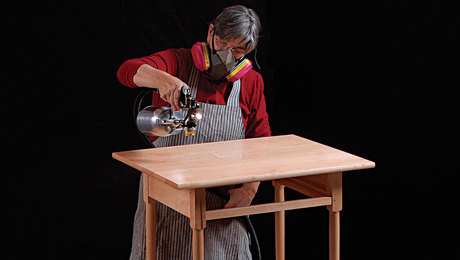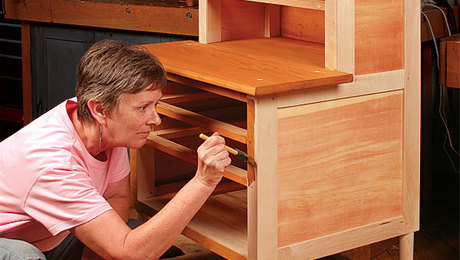STL286: Finish sprayers—Turbine or Compressor?
Mike and Ben welcome new associate editor, Amanda Russell to the mix, and discuss sprayer options, magnets, and what other craft skills translate to woodworking.Question 1:
From Thea in Amsterdam:
I have been a subscriber to both Threads and FWW. I know your wife is a fiber artist. I wonder how you guys feel about this video.
It doesn’t seem to be true to me but I suck at both woodworking and sewing so I guess I’m not the person to ask.
What I do think, is that hobbies with a technical AND creative component all have similar challenges. Wood has seasonal moisture challenges, fabric has give. When you weave, you probably have limitations based on the size of the loom that you also have with planers.
You and your partner, do you learn tricks from each other? I don’t know, how to do mitered corners or use up scraps or learn new skills. I noticed when I started woodworking it was sometimes easier to do certain things, like plan a project and use up wood efficiently because I used those skills already when sewing. I guess my question is: are there any universal skills between fields? Do you learn from each other?
Question 2:
From Dave:
I’ve had a cheapish sprayer that’s recently died. It was great for throwing paint at walls and fences and was adequate at spraying shellac at furniture, but I found that even at its lowest setting, it would run through an entire 500ml container in minutes – I would only spray outdoors, but I guess most of the shellac ended up as overspray.
Recently this sprayer died and I’m looking at replacing it with something a bit better. It seems the options are a compressor-driven unit or a much more expensive multi-stage turbine unit.
Can you talk about the differences between all these types of sprayers? For me, I’d like something that was a bit more economical on the amount of wasted finish and allows better control of what I’m spraying.
My shop is fairly well set up with cordless tools (battery nailers etc), so I don’t really want to get a compressor for what would be a single-use tool – this is making me lean towards the turbine setup, but I’d like to know a bit more about the advantages/disadvantages of each.
 |
Spray Systems for the Home ShopThe latest turbine HVLP spray systems are powerful, compact, and affordable. Here’s professional advice on how to make the best choice. |
 |
Re-creating a Shaker FinishTo match a 200-year-old finish, an expert uses common tools and techniques |
Segments:
Amanda: All time favorite tool – Lost Art Press Tool Roll
Mike – StewMac.com
Ben: Using a sanding drum to chuck a piece into the lathe as seen in this video.
Question 3:
From Chris:
I recently changed from a knife block in the kitchen to a wall mounted magnet bar to save space. Could I buy one? Sure. Could I make one out of nicely figured walnut or maple? Hell yeah! That said, let’s do it really well and have fun.
Two questions: 1. Any outside-the-box wood suggestions that will wow the eye when you pull the knife off? 2. Ben, what’s your preferred source for really strong bar magnets? I know you’ve talked about it on a previous episode but cannot find that snippet for the life of me. Aside from the knives being high quality, some are also irreplaceable. Years ago I nearly lost a toe and broke the tip of a knife when it fell off the wall… I like my toes and I’d hate to live that again due to inferior magnets.
Ben’s favorite website for magnets: https://www.kjmagnetics.com/
Every two weeks, a team of Fine Woodworking staffers answers questions from readers on Shop Talk Live, Fine Woodworking‘s biweekly podcast. Send your woodworking questions to shoptalk@taunton.com for consideration in the regular broadcast! Our continued existence relies upon listener support. So if you enjoy the show, be sure to leave us a five-star rating and maybe even a nice comment on our iTunes page.





















Comments
“[Deleted]”
Mike used a word I have never heard before. Man'new'cha. I don't know if I'm even spelling this right. What is it? What does it mean?
Minutiae?
Welcome Amanda, I enjoyed hearing about your woodworking experiences and look forward to your future participation on the podcast.
Helpful as most always! Enjoyed having Amanda aboard. Thanks for the input on sprayers. I've been thinking I need one... and learned that for my work, I really don't. Good info.
I disagree with the comment that sewing is less precise than woodworking. My wife sews. both clothes and quilts. She is very precise almost obsessive about being precise. What you see in sewing, just like woodworking is that when you are not precise, the end product is sloppy.
“[Deleted]”
Log in or create an account to post a comment.
Sign up Log in